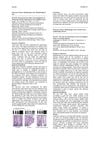Transient Mitochondrial DNA Double Strand Breaks in Mice Cause Accelerated Aging Phenotypes in a ROS-Dependent but p53/p21-Independent Manner
December 2016
in “
Cell Death & Differentiation
”

TLDR Damaging mitochondrial DNA in mice speeds up aging due to increased reactive oxygen species, not through the p53/p21 pathway.
The study from December 2016 found that inducing mitochondrial DNA double strand breaks (mtDNA DSBs) in mice led to accelerated aging phenotypes, especially in tissues with high cell turnover. The aging effects were associated with increased levels of reactive oxygen species (ROS) and were observed in the thymus, skin, bone marrow, and testis, as well as in progenitor cells. Importantly, these effects occurred independently of the p53/p21 pathway, as evidenced by the fact that antioxidant treatments alleviated the aging phenotypes, while the knockout of p21 or p53 genes did not prevent them. This suggests that mtDNA damage contributes to aging through ROS production and impacts progenitor cell pools, challenging the previously understood role of the p53/p21 pathway in aging related to mtDNA damage.




